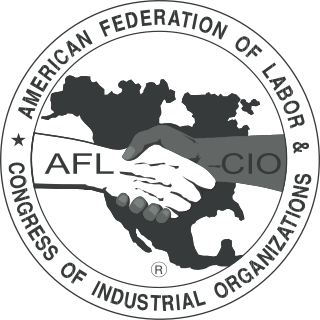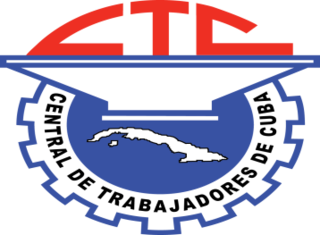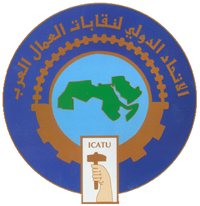Related Research Articles

Cameroon, officially the Republic of Cameroon, is a country in Central Africa. It is bordered by Nigeria to the west and north; Chad to the northeast; the Central African Republic to the east; and Equatorial Guinea, Gabon and the Republic of the Congo to the south. Its coastline lies on the Bight of Biafra, part of the Gulf of Guinea and the Atlantic Ocean. The country is sometimes identified as West African and other times as Central African, due to its strategic position at the crossroads between West and Central Africa. Its nearly 25 million people speak 250 native languages.
A trade union, often simply referred to as a union, is an organization of workers who have come together to achieve common goals, such as protecting the integrity of their trade, improving safety standards, and attaining better wages, benefits, and working conditions through the increased bargaining power wielded by solidarity among workers. Trade unions typically fund the formal organization, head office, and legal team functions of the trade union through regular fees or union dues. The delegate staff of the trade union representation in the workforce are made up of workplace volunteers who are appointed by members in democratic elections.

The American Federation of Labor and Congress of Industrial Organizations (AFL–CIO) is the largest federation of unions in the United States. It is made up of 56 national and international unions, together representing more than 12 million active and retired workers. The AFL–CIO engages in substantial political spending and activism, typically in support of liberal or progressive policies.
The Korean Confederation of Trade Unions (KCTU), literally translated as National Democratic Confederation of Trade Unions, also known as Minju-nochong is a national trade union centre officially established in 1995. Its predecessor was the National Council of Trade Unions (NCTU), established in 1990 as an independent, democratically operated alternative to the Federation of Korean Trade Unions. Following the 2016–17 South Korean protests, the KCTU has seen accelerated growth in union enrollment, reaching 963,035 members in 2018 and making it the largest industrial union confederation in Korea.
LO, The Danish Confederation of Trade Unions was founded in 1898 and was an umbrella organisation for 18 Danish trade unions. At the end of 2018, it merged into the new Danish Trade Union Confederation.

The Swedish Trade Union Confederation, commonly referred to as LO, is a national trade union centre, an umbrella organisation for fourteen Swedish trade unions that organise mainly "blue-collar" workers. The Confederation, which gathers in total about 1.5 million employees out of Sweden's 10 million people population, was founded in 1898 by blue-collar unions on the initiative of the 1897 Scandinavian Labour Congress and the Swedish Social Democratic Party, which almost exclusively was made up by trade unions. In 2019 union density of Swedish blue-collar workers was 60%, a decline by seventeen percentage points since 2006. A strongly contributing factor was the considerably raised fees to union unemployment funds in January 2007 made by the new centre-right government.

The World Confederation of Labour (WCL) was an international labour organization founded in 1920 and based in Europe. Totalitarian governments of the 1930s repressed the federation and imprisoned many of its leaders, limiting operations until the end of World War II. In 2006 it became part of the International Trade Union Confederation (ITUC), ending its existence as an independent organization.
The General Federation of Workers Trade Unions in Bahrain(Formerly known as the General Committee for Bahrain Workers) (GFWTUB) is a national trade union federation in Bahrain. It was established in 2002, by the Workers Trade Union Law granting workers the right to organize collectively.
The General Confederation of Free Workers of Cameroon (CGTLC) is a trade union centre in Cameroon.
The Union of Central African Workers, created in 1964, is a trade union centre in the Central African Republic. It was formed by the merger of the African Confederation of Free Trade Unions-Workers Force-Central African Republic, African Confederation of Believing Workers - Central African Republic, African General Confederation of Labour-Central African Republic and the FECETEC. In 1981, its activity was suspended by David Dacko's government. In place of it government-backed Confederation of Central African Workers was established, which didn't stand up for the rights of workers in practice.

The Workers Central Union of Cuba is the trade union federation in Cuba. It originated as the Confederación de Trabajadores de Cuba in 1939 and changed its name to the Central Union of Cuban Workers in 1961.

The International Confederation of Arab Trade Unions is the international representation of trade unions in a number of Arab nations.

Hind Mazdoor Sabha (HMS) is the third largest trade-union federation in India after the All-India Trade Union Congress and the Indian National Trade Union Congress. The HMS was formed by the Socialists in 1948 but has little real connection with the Socialist Party. It is one of the least political and most pragmatic trade-union federations in India. The HMS is affiliated with the International Confederation of Free Trade Unions.
The Myanmar Maritime Trade Unions Federation, formerly known as Seafarers Union of Burma (SUB) is a trade union in Myanmar. It represents an estimated 20,000-30,000 workers in the international shipping industry, many of whom work on Flag of Convenience ships and suffer from poor work and pay conditions.
In December 1996 and January 1997, South Korea experienced the largest organized strike in its history, when workers in the automotive and shipbuilding industries refused to work in protest against a law which was to make firing employees easier for employers and curtail labor organizing rights.

The ICFTU Inter American Regional Organisation of Workers was the regional organization of the International Confederation of Free Trade Unions (ICFTU) for the Americas.
see alsoHuman rights in Colombia
The Plantation Workers International Federation was an international trade secretariat of the International Confederation of Free Trade Unions. PWIF was founded at the firth ICFTU world congress held in Tunis in July 1957. Samuel Powell Claret was appointed as the general secretary of PWIF and Tom S. Bavin as its Director of Organisation. PWIF was launched by ICFTU to organize plantation unions in the Third World.
Alice Ouédraogo is a Burkinabé public health official. A lawyer by profession she has worked extensively with the International Labour Organization (ILO). Ouédraogo was ILO representative to Cameroon and Ethiopia and also director of its Central Africa region. She is currently head of the ILO HIV/AIDS programme and works to reduce the transmission of HIV and increase the number of people in treatment.
References
- ↑ "Cameroon". Freedomhouse.org. 2013-03-08. Retrieved 28 December 2017.
- ↑ U.S. Department of State (March 1996). "Cameroon Human Rights Practices, 1995". Uic.edu. Retrieved 28 December 2017.
- ↑ Mark Dike DeLancey; Rebecca Mbuh; Mark W. Delancey (2010). Historical Dictionary of the Republic of Cameroon. Scarecrow Press. p. 368. ISBN 9780810873995.